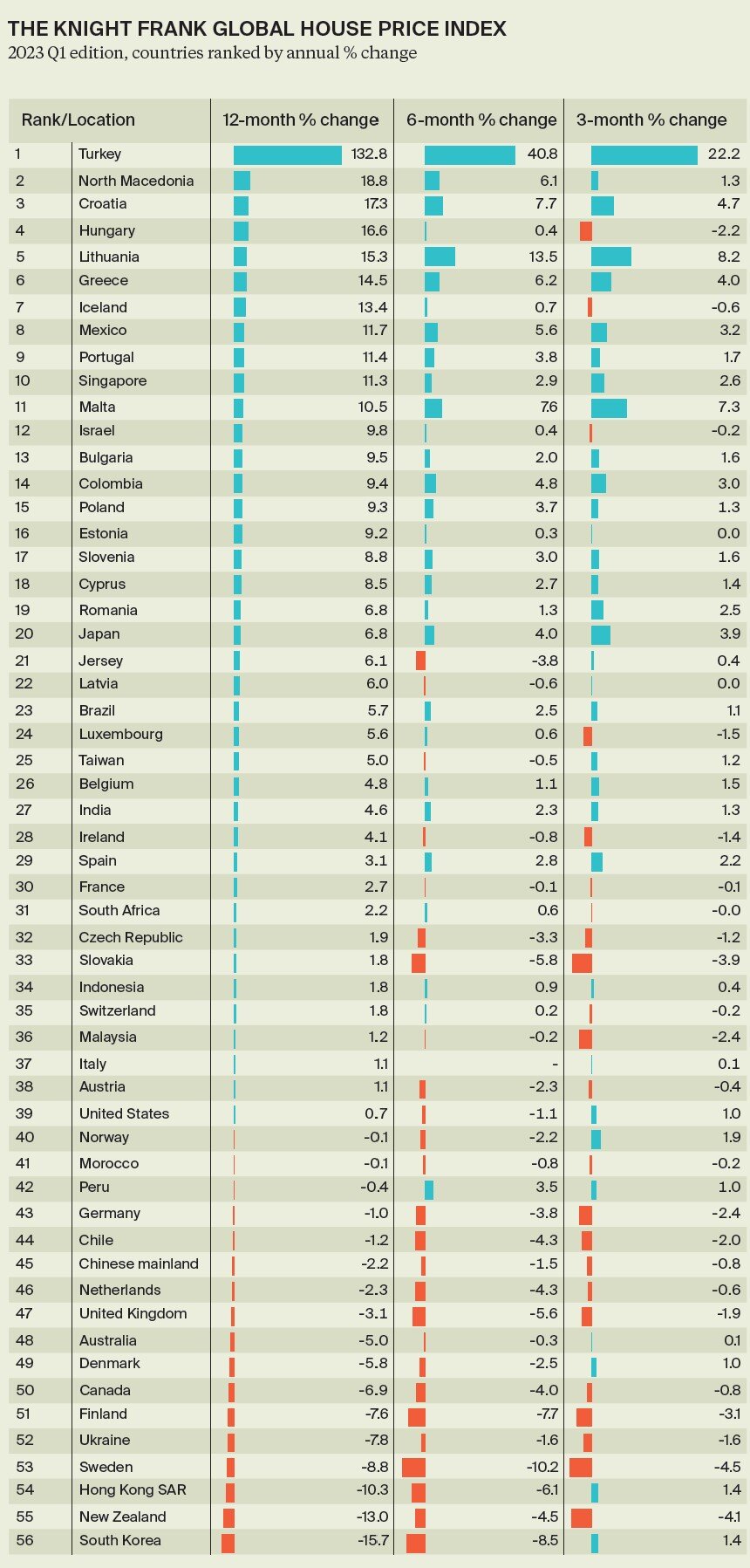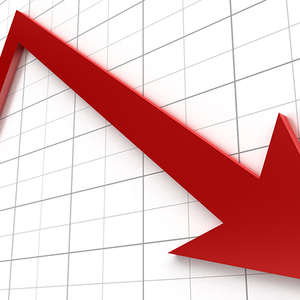Residential Real Estate News

Global Home Price Growth Slows to Lowest Levels Since 2015
Residential News » Istanbul Edition | By Michael Gerrity | July 7, 2023 9:07 AM ET
Home prices worldwide under pressure as central banks attempt to rein in inflation
According to international property consultant Knight Frank, house prices across the world are under pressure as central banks attempt to rein in inflation. Average annual price growth across the 56 markets covered by the Knight Frank Global House Price Index slowed to 3.6% in the twelve months to Q1 2023, down from 5.7% in the previous quarter.
The index is rising at the slowest annual rate since the third quarter of 2015 and is down from a recent peak of 11.1% growth in the year to Q1 2022, when global markets were booming in the aftermath of the pandemic.
Of the 56 markets tracked, 17 recorded annualised price falls, eight of which saw a contraction of more than 5%. 23 of the markets covered saw prices fall over the most recent three-month period.
While the latest data reveals a substantial slowdown in annual price growth, quarterly growth improved. Global house prices contracted 0.6% in the final three months of 2022 yet saw a 1.5% rise in the first three months of 2023. On its own this reversal doesn't confirm that global markets are set to improve - rather, it does highlight that tight supply, limited new housing construction and strong household formation are acting to underpin prices in many markets.
Liam Bailey, global head of research at Knight Frank said, "While the latest data reveals a substantial slowdown in annual price growth, quarterly growth improved. Global house prices contracted 0.6% in the final three months of 2022 yet saw a 1.5% rise in the first three months of 2023. On its own, this reversal doesn't confirm that global markets are set to improve - rather, it does highlight that tight supply, limited new housing construction and strong household formation are acting to underpin prices in many markets."
MARKET LEVEL ANALYSIS
Turkey led the ranking again last quarter, but it's phenomenal growth of 132.8% is largely a consequence of rampant inflation. The recent move to a more orthodox approach to monetary policy is unlikely to lead to a rapid downward shift in inflationary pressures. A 22% quarterly rise in house prices there in Q1 suggests there is more to come this year.
Eastern and south-eastern European countries dominate the top of the rankings with North Macedonia (18.8%), Croatia (17.3%) and Hungary (16.6%) all showing strong annual growth.
Singapore is the standout performer in the Asia-Pacific region, with 11.3% annual growth. Recent changes to tax policy have mainly targeted overseas buyers to try to cool rising prices, though there were enough domestic buyers to push prices to new highs. The Urban Redevelopment Authority is releasing new sites for development as it seeks to increase housing supply.
US prices ticked up 1% in Q1. Supply is tight, which is underpinning price growth despite worsening affordability, particularly in the growth markets across the southeast and southwest states.
South Korea (-15.7%), New Zealand (-13%), Hong Kong (-10.3%) and Sweden (-8.8%) sit at the bottom of the table.
While substantial pressures remain due to rising debt costs, Hong Kong's market has begun to see a tentative revival, with positive quarterly growth of 1.4%. The late reopening of the economy after the Covid-19 pandemic limited overseas and mainland demand - which is now beginning to revive.
New Zealand has seen one of the biggest corrections in prices globally in this cycle. While prices are likely to fall further, the speed and depth of the correction suggest that an uptick in both demand and eventually prices will come earlier than in many other developed markets. ANZ Bank expects growth in both metrics before the end of the year.
MARKET OUTLOOK
While New Zealand may soon point to an exit route from the global housing slowdown, and the US is surprising on the upside, there are still several risks ahead for most markets. Inflation remains the main issue. Headline rates are falling in most locations, but core inflation remains stubbornly high in the UK, the US and Europe.
As several housing markets worldwide approach peak interest rates, the downward pivot may be further away than anticipated even a month or so ago. The first cuts in policy rates may be delayed to the second half of 2024 for several key markets, which would lower transactions and market liquidity for 12-months or more, concludes Knight Frank.
Sign Up Free | The WPJ Weekly Newsletter
Relevant real estate news.
Actionable market intelligence.
Right to your inbox every week.
Real Estate Listings Showcase
Related News Stories
Residential Real Estate Headlines
- Las Vegas Housing Market Tilts Toward Buyers as Prices Cool
- Ultra-Luxury Home Sales Surge Globally in Late 2025 as 555 Mega-Deals Close
- U.S. Luxury Home Prices Outpaced the Broader Market in 2025
- U.S. Homeowner Equity Growth Cooled in 2025 but Remained Historically Strong
- U.S. Homebuyers Scored Biggest Price Discounts Since 2012 as Market Shifts
- Ten Key Takeaways from the U.S. Housing Market in January
- Hong Kong Stock Market Front-Runs Local Home Prices by Two Months
- Mass Exodus: U.S. Homebuyers Cancel Deals at Record Levels
- U.S. Housing Outlook for 2026 Darkens After Sharp December Pullback in Contract Signings
- America's Housing 'Silver Tsunami' Is Turning Into a Trickle
- Builders Tell Congress Government Rules Are Pricing Americans Out of Housing
- California Housing Market Poised for Balanced Growth in 2026
- U.S. Housing Market Hits Largest Buyer-Seller Imbalance on Record
- Miami Housing Market Ends 2025 on Firmer Ground
- U.S. Homebuilder Confidence Dips at Start of 2026
- Remodeling Outlook Improves as U.S. Homeowners Tap Equity
- U.S. Home Sales Hit Three-Year High in December as Rates Ease
- Las Vegas Area Home Sales Hit 18-Year Low in 2025
- U.S. Mortgage Rates Hit Three-Year Low in January
- U.S. Home Affordability Closed Out 2025 Near Record Lows
- Ireland Home Prices Uptick 5.5 Percent in 2025 Amid Supply Shortages
- One Year After Los Angeles Wildfires, Investors Snap Up Burned Lots
- Greater Palm Beach Area Home Sales Surge in Late 2025
- U.S. Homebuilder Sentiment Ends 2025 in Negative Territory
- America's Single-Family Rent Boom Loses Steam in Late 2025
- Miami Home Price Gains Extend 14-Year Run in 2025
- Why Pre-Biden Mortgages Froze the U.S. Housing Market
- From Bricks to Blockchain: How Digital Dollars Could Soon Rewire Global Real Estate
- U.S. Home Sales Slightly Uptick in November
- Greater Orlando Area Home Sales Dive 22 Percent in November
- World Property Exchange Aims to Make Real Estate Ownership Instantly Tradeable and Democratized on a Planetary Scale
- Falling Home Prices Slash U.S. Homeowner Equity by $13,400 on Average in 2025
- Home Listings in U.S. See Sharpest Drop in Two Years Amid Cooling Buyer Demand
- Dutch Investors Pour Record $4.2 Billion in New Rental Housing in 2025
- U.S. Housing Markets Poised for 2026 Rebound, NAR Says
- Las Vegas Home Prices Hit Record High in November as Inventory Swells, Sales Cool
- Investors Accounted for 30 Percent of All U.S. Home Purchases in 2025
- Canadian Home Sales Recovery Continues in October
- Global Luxury Home Price Growth Cools to 2-Year Low in September
- U.S. Housing Market Recovery to Remain Fragile in 2026








